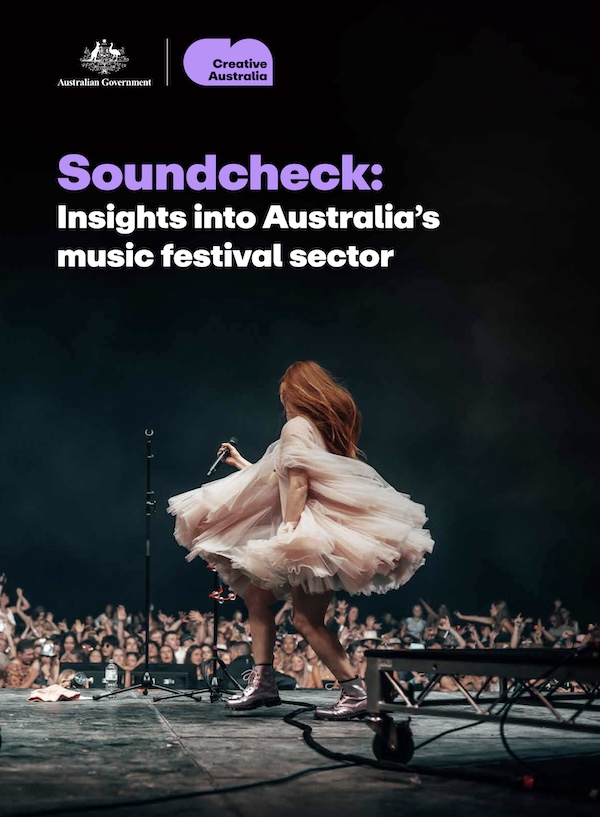Released today (9 April), Creative Australia’s much anticipated research report into Australia’s music festival sector has now been tabled. It is the first report of its kind, and provides an overview of the sector’s health and challenges.
Creative Australia was tasked with conducting the research as part of the Federal Government’s National Cultural Policy Revive.
Creative Australia Executive Director of Strategic Development and Partnerships, Georgie McClean said: ‘Music brings us together and millions of Australians attend festivals annually. Yet, until now, the size, scale and impact of the industry has not been well-documented or understood.’
Titled ‘Soundcheck: Insights into Australia’s music festival sector‘, it includes insights from the 2022-23 financial year data, and drills down on the cultural, social and economic impact of music festivals. It includes information on ticketing and attendance trends, and the where, when and what of music festivals around the country, according to the peak body.
Jump to:
The key findings
- A total of 535 music festivals were presented across Australia during the 2022-23 financial year; this is almost 1.5 music festivals for every day of the year.
- Victoria and NSW presented the highest number of festivals – 149 each.
- Australian music festivals represent a diverse range of genres. Almost one in four music festivals in Australia is an electronic music festival (23% of festivals). Other popular genres include rock (21%), country (19%) and indie (17%).
- It is estimated that four out of five acts who play at Australian music festival are Australian (80%).
- Of the Festivals held between 2022-23 42% commonly attracted 1000 to 10,000 attendees, 19% attracted higher attendances.
- An average cost to run a music festival is $3.9 million. While more than half of the festivals surveyed reported a profit (56%, with a median profit of $731,579), more than one in three music festivals reported a deficit (35%).
- There are signs of recovery in ticket purchasing trends, suggesting the industry is recovering from the impact of the COVID-19 pandemic. In 2022-23 on average 9506 tickets per festival were sold.
- Patterns of later ticket purchasing are continuing.
- Regarding age demographics, 18- to 24-year-olds are purchasing tickets at lower rates than before the COVID-19 pandemic. In 2018-19, before the pandemic, young Australians aged 18-24 were the primary consumer group for music festivals. In 2022–23, however, those in their mid- to late-20s were purchasing tickets at greater rates.
- Organisers nominated rising operational costs as the most significant challenge to running a music festival; 47% say this is having a major impact.
- The lack of availability of funding and grants was the second greatest challenge with 39% expressing this as a severe impact.
- Insurance and extreme weather events were also an issue, with 22% of festivals citing them as a severe challenge to operation.
- Two key regulatory barriers for festival organisation were navigating planning and/or local government and council requirements, and police and security requirements.
- More than half (53%) of festival organisers view supporting local tourism as the key strength of music festivals.
- Additionally, 45% identify creating a sense of community as a key strength.
- For most festivals, health, medical and liquor licensing requirements were the least challenging part of the regulatory framework of staging an event.
‘Soundcheck’ is accompanied by an online interactive dashboard, which can be used to explore the festival scene across all states and territories.
Moving forward
McClean said the hope is that festival organisers can use the report as a useful tool ‘to better understand the role and contribution of festivals within the broader creative industries as they face multiple challenges’.
She added that it is not the final word, and that the organisation will work with Music Australia in ‘undertaking further research into how Australians discover, engage with and consume music, in order to better understand the broader ecosystem that underpins live music including festivals’.
Read: Little splendour in music festival cancellations

Mitch Wilson, Australian Festivals Association (AFA) Managing Director, added, ‘’Soundcheck’ is a game changer for music festivals in Australia. This is the first ever national research on the size and benefits of our industry. It will be the bedrock of data for the AFA in our advocacy work for years to come.’
Upon the tabling of the report today, Senator Sarah Hanson-Young, Greens Spokesperson on the Arts and Chair of the Senate Inquiry into the National Cultural Policy, said, ‘[It] has highlighted that there is a lack of funding, grants and support available for the festivals sector from government.’
She made the point that the festival sector funds not only artists, but also hospitality and tourism.
‘It is not a surprise to hear festival organisers say that extreme weather and insurance are among their biggest challenges… The first thing the Albanese Government could do to support the sector is assist in underwriting insurance for festivals,’ said Hanson-Young.
Read: Australian music festivals are increasingly affected by climate change
Urging the Government to address this issue in the May budget, she concluded: ‘This is not just about the big name, corporate backed festivals, but, more importantly, it’s about supporting local and independent festivals.’
The Senate Inquiry into the National Cultural Policy will investigate the issues surrounding festivals at a hearing on Tuesday 16 April 2024.





